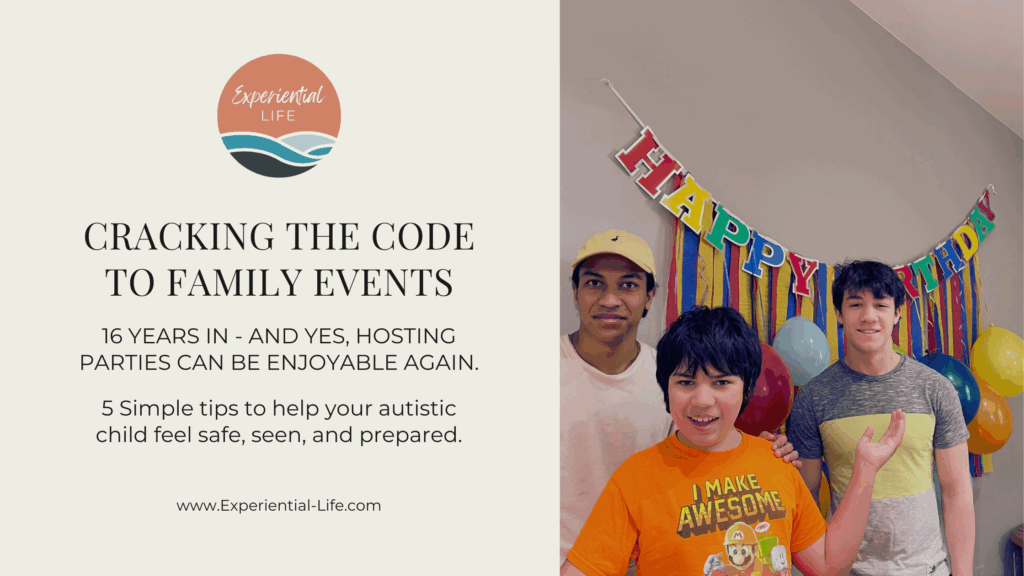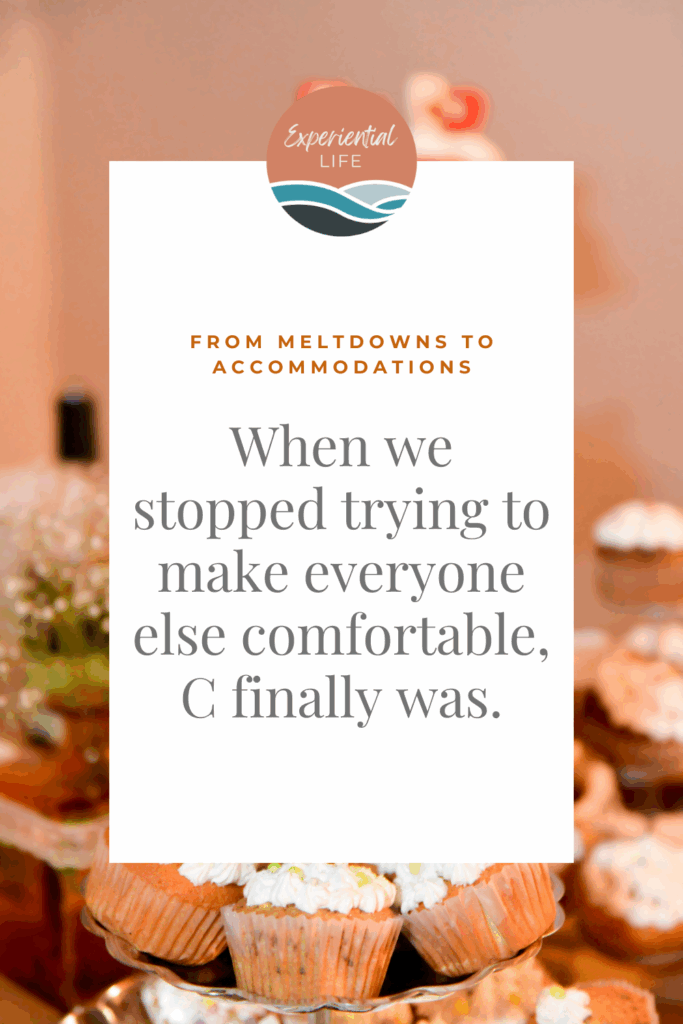Simple Tips That Will Help Your Neurodivergent Child Enjoy Family Events
- by Christy
Simple Tips That Will Help Your Neurodivergent Child Enjoy Family Events
Family Events Shouldn’t Feel Like a Trade-Off
Do large family events trigger your neurodivergent child? Do you decline attending or even hosting because the exchange of extended family time for a meltdown is an exchange not worth making?
Not to be dramatic, but after 16 years of parenting an autistic child, we’ve cracked the code to making family events tolerable for everyone.

When Family Events Just Feel Too Hard
On Friday, my father-in-law turned 90 – And a 90th birthday requires a celebration.
But big parties, large events, and long stretches sitting at a table to eat are like kryptonite to C (my autistic teen).
For a long time, we just stopped going to and hosting family events. They triggered meltdowns. Well-meaning people inserting themselves with (un)helpful advice or offers to calm him down. None of which helped.
It only made the meltdown worse – keeping us locked in a space no one wanted to be in any longer.
We thought hosting would fix it. It didn’t.
Then we started hosting parties. We could control the people, and C is comfortable in our space.
And it worked better, but he still hated people touching his things, feeling forced to be present – at the table or in the family room – with ALL the people.
Letting C Decide Changed Everything
One holiday, as a family, we agreed C should join when he wanted, how he wanted – and that’s when everything changed for us.
The Moment Everything Changed
We spent so much time worrying about accommodating everyone else’s needs – we forgot that it’s our son who needs the most accommodations and support.
It sounds silly, looking back.
But that’s ableism at work…
Ableism is when people treat someone unfairly or unkindly because they have a disability.
It’s when someone thinks a person isn’t as smart, strong, or important just because they move, talk, think, or learn differently.

Everyday Examples of Ableism in Real Life
It shows up in a lot of ways – some obvious, some subtle:
→ Assuming someone isn’t smart or can’t understand just because they don’t speak.
→ Making spaces, events, or services that don’t consider mobility, sensory, or communication needs.
→ Praising someone for “overcoming” their disability instead of accepting them as they are.
→ Acting like accommodations are “special treatment” instead of basic access.
→ Designing rules, policies, or expectations based on what works best for non-disabled people and calling it “fair.”
It wasn’t until we recognized our ableism, C’s sensory needs, and let go of our expectations, that we truly accommodated C.
We had to let go of our desire to make other people feel comfortable.
5 Things That Helped C Enjoy Family Events
So… what changed?
Honestly? We stopped accommodating and trying to meet everyone else’s expectations and started focusing on what C needs.
– Not some Pinterest version of a perfect party.
– Not what makes Gungle feel like he’s bonding.
– Not even what we were raised to believe family gatherings should look like.
To be clear: this didn’t happen overnight. It took trial and error, a few arguments, and a lot of tears.
But once we stopped pushing C to participate in the way everyone else expected, everything started to shift.
This next part isn’t a magic fix. It’s just what’s worked for us over time – and it might give you a place to start.
Here are 5 things that work for us:
✔️ We talk about the family event no less than 1 week before. We tell him who is coming, when they will arrive, what we plan to do, and what time we expect people to leave.
✔️ We keep talking about the event throughout the week – sometimes he will come to us hours after we talk about it to ask questions. We know he needs time to process change and wants a bit of control over what the change will look like.
✔️ C doesn’t have to engage with the event or guests at all – unless he chooses to. This is his home, his room is off-limits to guests, but he gets to choose where he wants to be – and we work around that.
✔️ He doesn’t have to eat with us. He has a routine around food and mealtimes. Parties and events disrupt the routine – he can choose to eat with us (sometimes he does), or he can choose to stick to his routine.
✔️ When everyone is leaving, he can choose to say goodbye, give hugs, or keep his distance. Once everyone has left, he gets as much time and space to decompress in his room (his safe space) as needed. We drop ALL expectations and demands. If he wants his normal bedtime routine, we do it – but if he needs to hide under the covers with the iPad until he falls asleep – that’s what he gets.
It’s Hard, But You’re Not Alone
It’s hard to feel disconnected from family and friends – and know that big, loud, crowded events can be a sensory nightmare for our neurodivergent kids.
It’s also hard to explain to family and friends why we parent the way we do – it is a low-demand and much softer approach to parenting.
But meltdowns and tears – plus missing our family and friends – led us to this approach.
If this sounds familiar, you’re not alone.
How do you navigate family functions or parties with friends?
I’d love to hear how your family navigates events, parties, and/or holidays. Drop your go-to strategies in the comments below.
And if this helped, send it to someone in your circle. Want more like this? Subscribe to get future tips, stories, and support from the Experiential Life community.
